Deakin University HNN215: Case Study Analysis of Ms. Tong
VerifiedAdded on 2022/10/08
|9
|2571
|53
Case Study
AI Summary
This case study analyzes the medical history and treatment of Ms. Tong, a patient admitted to the hospital with abdominal pain, vomiting, and a history of hypertension, hyperlipidaemia, and depression. The analysis examines the medications Ms. Tong was taking, including Ramipril, Felodipine, Atorvastatin, and Citalopram, exploring their uses, side effects, and potential interactions. The case study also delves into the development of peptic ulcers caused by a Helicobacter pylori infection and the role of Ibuprofen. Furthermore, it emphasizes the nursing responsibilities in medication management, including patient education, dietary considerations, and the avoidance of medication errors. The study highlights the importance of understanding drug contraindications, potential adverse effects, and the need for nurses to provide appropriate care and guidance to patients regarding their medications and overall health.
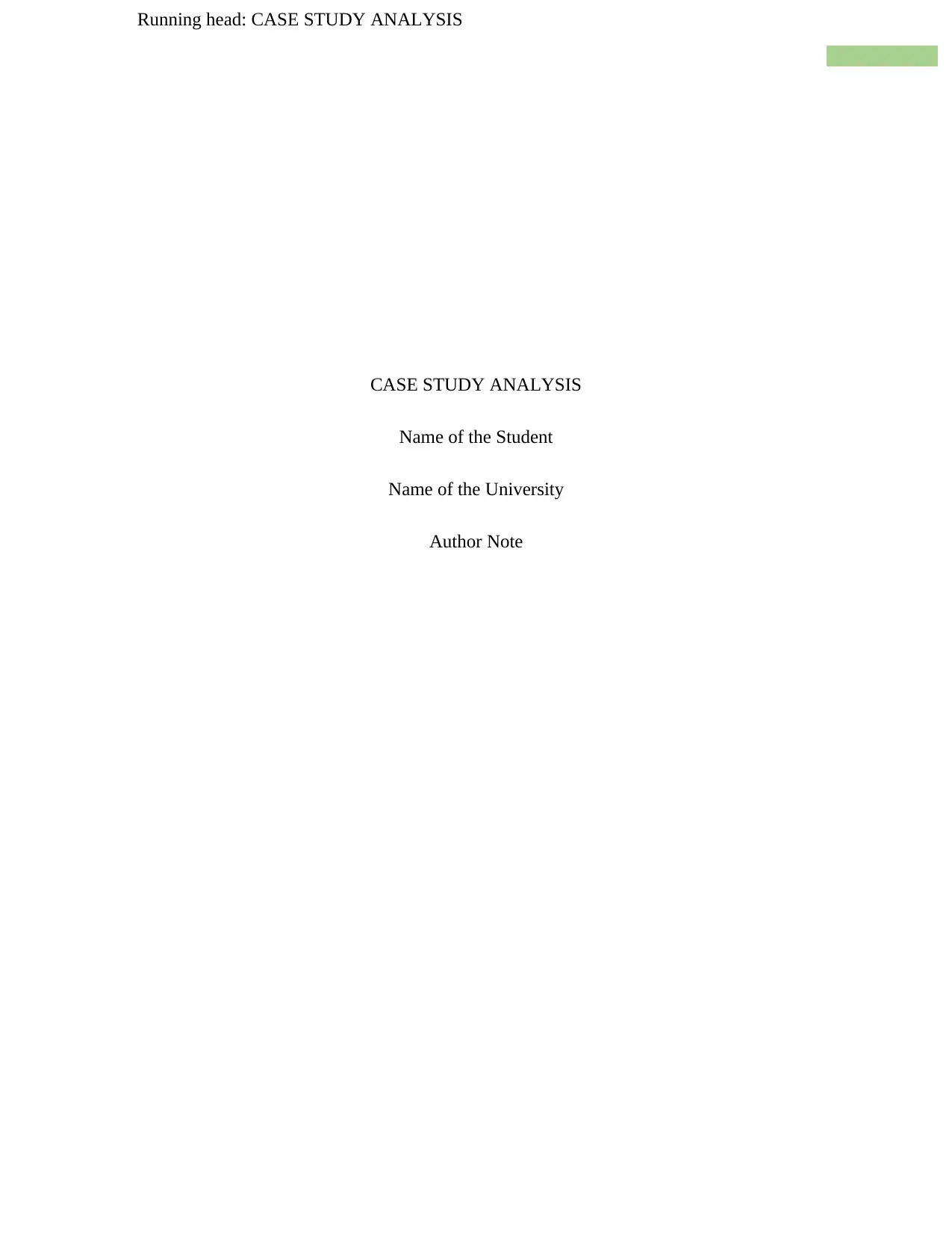
Running head: CASE STUDY ANALYSIS
CASE STUDY ANALYSIS
Name of the Student
Name of the University
Author Note
CASE STUDY ANALYSIS
Name of the Student
Name of the University
Author Note
Paraphrase This Document
Need a fresh take? Get an instant paraphrase of this document with our AI Paraphraser
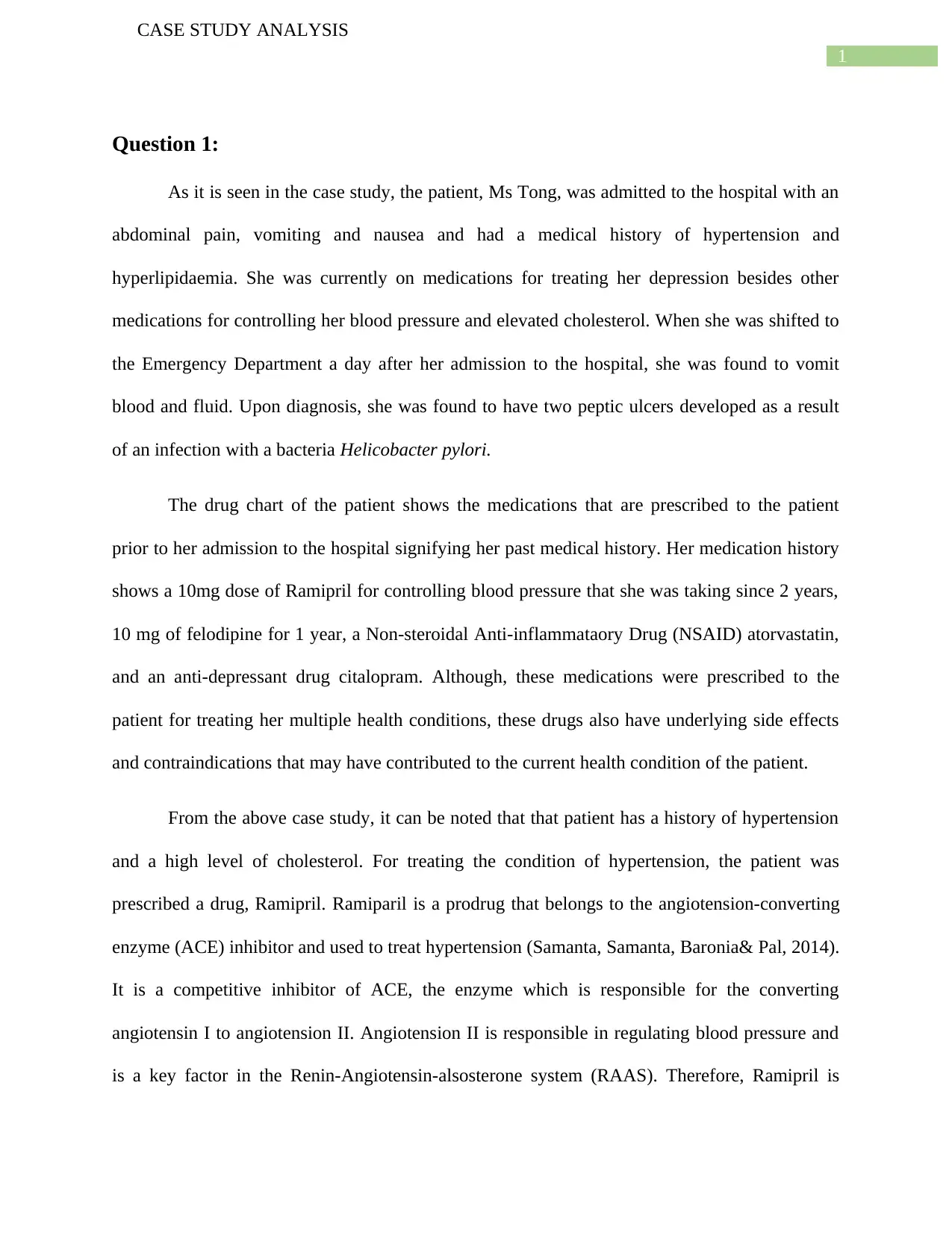
1
CASE STUDY ANALYSIS
Question 1:
As it is seen in the case study, the patient, Ms Tong, was admitted to the hospital with an
abdominal pain, vomiting and nausea and had a medical history of hypertension and
hyperlipidaemia. She was currently on medications for treating her depression besides other
medications for controlling her blood pressure and elevated cholesterol. When she was shifted to
the Emergency Department a day after her admission to the hospital, she was found to vomit
blood and fluid. Upon diagnosis, she was found to have two peptic ulcers developed as a result
of an infection with a bacteria Helicobacter pylori.
The drug chart of the patient shows the medications that are prescribed to the patient
prior to her admission to the hospital signifying her past medical history. Her medication history
shows a 10mg dose of Ramipril for controlling blood pressure that she was taking since 2 years,
10 mg of felodipine for 1 year, a Non-steroidal Anti-inflammataory Drug (NSAID) atorvastatin,
and an anti-depressant drug citalopram. Although, these medications were prescribed to the
patient for treating her multiple health conditions, these drugs also have underlying side effects
and contraindications that may have contributed to the current health condition of the patient.
From the above case study, it can be noted that that patient has a history of hypertension
and a high level of cholesterol. For treating the condition of hypertension, the patient was
prescribed a drug, Ramipril. Ramiparil is a prodrug that belongs to the angiotension-converting
enzyme (ACE) inhibitor and used to treat hypertension (Samanta, Samanta, Baronia& Pal, 2014).
It is a competitive inhibitor of ACE, the enzyme which is responsible for the converting
angiotensin I to angiotension II. Angiotension II is responsible in regulating blood pressure and
is a key factor in the Renin-Angiotensin-alsosterone system (RAAS). Therefore, Ramipril is
CASE STUDY ANALYSIS
Question 1:
As it is seen in the case study, the patient, Ms Tong, was admitted to the hospital with an
abdominal pain, vomiting and nausea and had a medical history of hypertension and
hyperlipidaemia. She was currently on medications for treating her depression besides other
medications for controlling her blood pressure and elevated cholesterol. When she was shifted to
the Emergency Department a day after her admission to the hospital, she was found to vomit
blood and fluid. Upon diagnosis, she was found to have two peptic ulcers developed as a result
of an infection with a bacteria Helicobacter pylori.
The drug chart of the patient shows the medications that are prescribed to the patient
prior to her admission to the hospital signifying her past medical history. Her medication history
shows a 10mg dose of Ramipril for controlling blood pressure that she was taking since 2 years,
10 mg of felodipine for 1 year, a Non-steroidal Anti-inflammataory Drug (NSAID) atorvastatin,
and an anti-depressant drug citalopram. Although, these medications were prescribed to the
patient for treating her multiple health conditions, these drugs also have underlying side effects
and contraindications that may have contributed to the current health condition of the patient.
From the above case study, it can be noted that that patient has a history of hypertension
and a high level of cholesterol. For treating the condition of hypertension, the patient was
prescribed a drug, Ramipril. Ramiparil is a prodrug that belongs to the angiotension-converting
enzyme (ACE) inhibitor and used to treat hypertension (Samanta, Samanta, Baronia& Pal, 2014).
It is a competitive inhibitor of ACE, the enzyme which is responsible for the converting
angiotensin I to angiotension II. Angiotension II is responsible in regulating blood pressure and
is a key factor in the Renin-Angiotensin-alsosterone system (RAAS). Therefore, Ramipril is
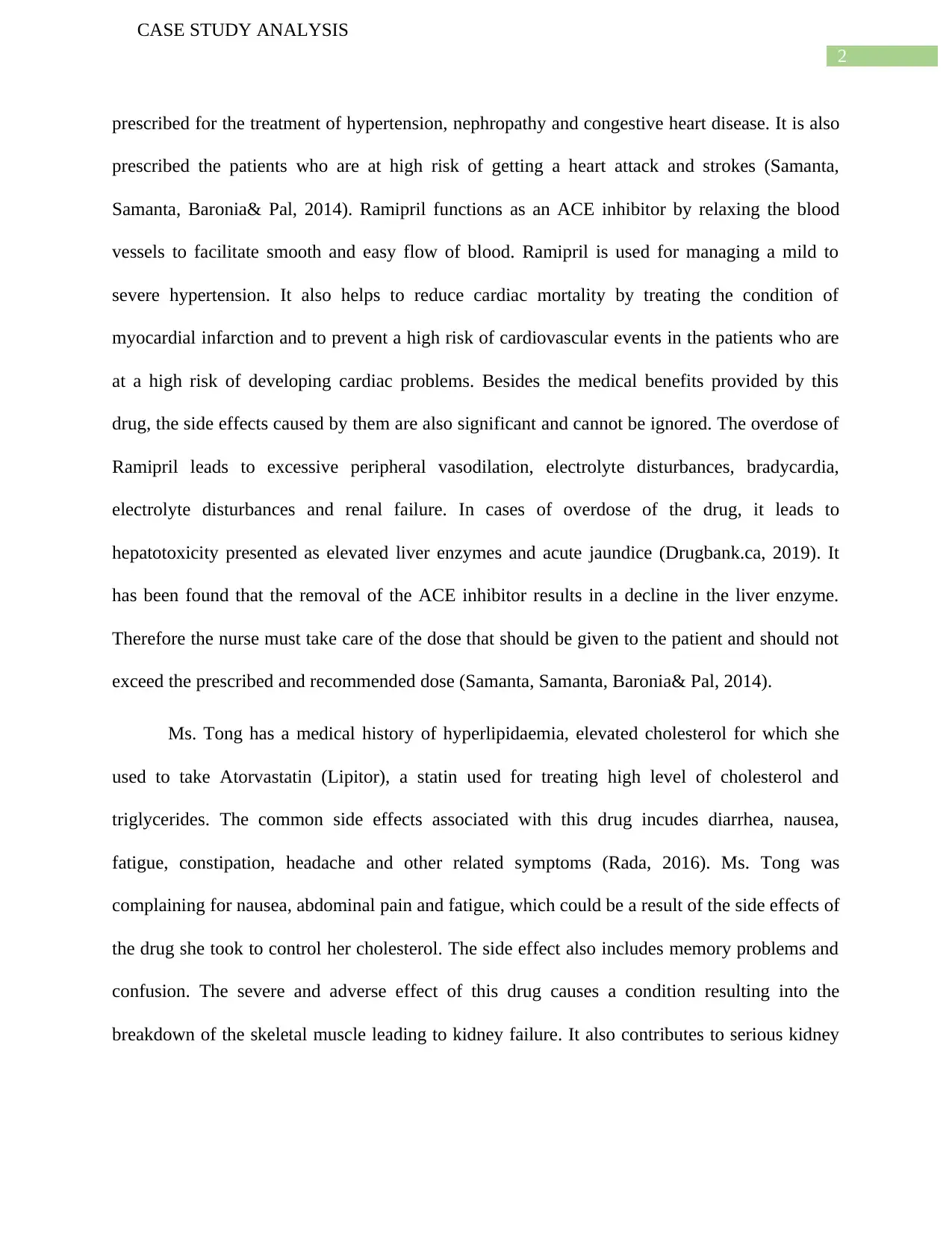
2
CASE STUDY ANALYSIS
prescribed for the treatment of hypertension, nephropathy and congestive heart disease. It is also
prescribed the patients who are at high risk of getting a heart attack and strokes (Samanta,
Samanta, Baronia& Pal, 2014). Ramipril functions as an ACE inhibitor by relaxing the blood
vessels to facilitate smooth and easy flow of blood. Ramipril is used for managing a mild to
severe hypertension. It also helps to reduce cardiac mortality by treating the condition of
myocardial infarction and to prevent a high risk of cardiovascular events in the patients who are
at a high risk of developing cardiac problems. Besides the medical benefits provided by this
drug, the side effects caused by them are also significant and cannot be ignored. The overdose of
Ramipril leads to excessive peripheral vasodilation, electrolyte disturbances, bradycardia,
electrolyte disturbances and renal failure. In cases of overdose of the drug, it leads to
hepatotoxicity presented as elevated liver enzymes and acute jaundice (Drugbank.ca, 2019). It
has been found that the removal of the ACE inhibitor results in a decline in the liver enzyme.
Therefore the nurse must take care of the dose that should be given to the patient and should not
exceed the prescribed and recommended dose (Samanta, Samanta, Baronia& Pal, 2014).
Ms. Tong has a medical history of hyperlipidaemia, elevated cholesterol for which she
used to take Atorvastatin (Lipitor), a statin used for treating high level of cholesterol and
triglycerides. The common side effects associated with this drug incudes diarrhea, nausea,
fatigue, constipation, headache and other related symptoms (Rada, 2016). Ms. Tong was
complaining for nausea, abdominal pain and fatigue, which could be a result of the side effects of
the drug she took to control her cholesterol. The side effect also includes memory problems and
confusion. The severe and adverse effect of this drug causes a condition resulting into the
breakdown of the skeletal muscle leading to kidney failure. It also contributes to serious kidney
CASE STUDY ANALYSIS
prescribed for the treatment of hypertension, nephropathy and congestive heart disease. It is also
prescribed the patients who are at high risk of getting a heart attack and strokes (Samanta,
Samanta, Baronia& Pal, 2014). Ramipril functions as an ACE inhibitor by relaxing the blood
vessels to facilitate smooth and easy flow of blood. Ramipril is used for managing a mild to
severe hypertension. It also helps to reduce cardiac mortality by treating the condition of
myocardial infarction and to prevent a high risk of cardiovascular events in the patients who are
at a high risk of developing cardiac problems. Besides the medical benefits provided by this
drug, the side effects caused by them are also significant and cannot be ignored. The overdose of
Ramipril leads to excessive peripheral vasodilation, electrolyte disturbances, bradycardia,
electrolyte disturbances and renal failure. In cases of overdose of the drug, it leads to
hepatotoxicity presented as elevated liver enzymes and acute jaundice (Drugbank.ca, 2019). It
has been found that the removal of the ACE inhibitor results in a decline in the liver enzyme.
Therefore the nurse must take care of the dose that should be given to the patient and should not
exceed the prescribed and recommended dose (Samanta, Samanta, Baronia& Pal, 2014).
Ms. Tong has a medical history of hyperlipidaemia, elevated cholesterol for which she
used to take Atorvastatin (Lipitor), a statin used for treating high level of cholesterol and
triglycerides. The common side effects associated with this drug incudes diarrhea, nausea,
fatigue, constipation, headache and other related symptoms (Rada, 2016). Ms. Tong was
complaining for nausea, abdominal pain and fatigue, which could be a result of the side effects of
the drug she took to control her cholesterol. The side effect also includes memory problems and
confusion. The severe and adverse effect of this drug causes a condition resulting into the
breakdown of the skeletal muscle leading to kidney failure. It also contributes to serious kidney
⊘ This is a preview!⊘
Do you want full access?
Subscribe today to unlock all pages.

Trusted by 1+ million students worldwide
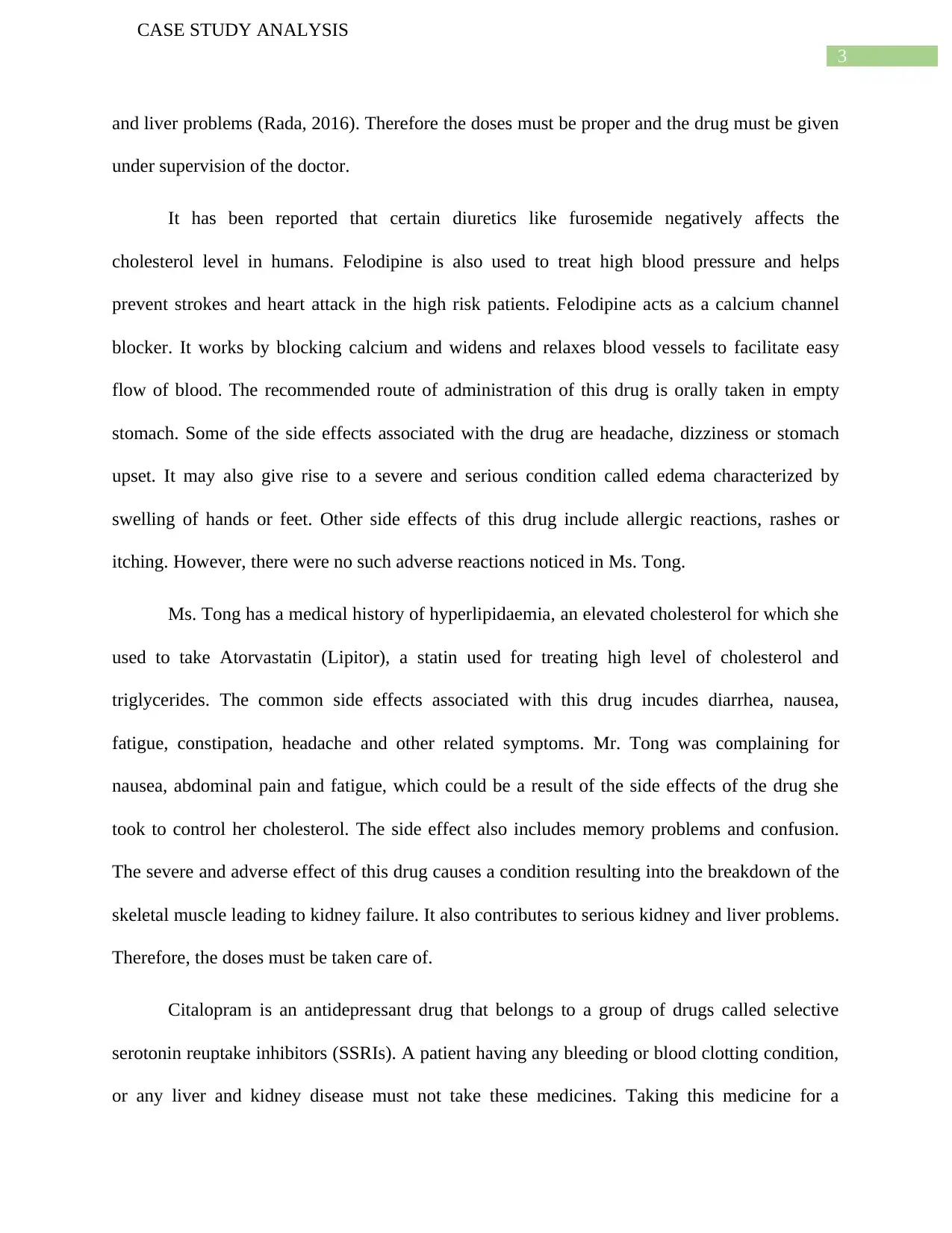
3
CASE STUDY ANALYSIS
and liver problems (Rada, 2016). Therefore the doses must be proper and the drug must be given
under supervision of the doctor.
It has been reported that certain diuretics like furosemide negatively affects the
cholesterol level in humans. Felodipine is also used to treat high blood pressure and helps
prevent strokes and heart attack in the high risk patients. Felodipine acts as a calcium channel
blocker. It works by blocking calcium and widens and relaxes blood vessels to facilitate easy
flow of blood. The recommended route of administration of this drug is orally taken in empty
stomach. Some of the side effects associated with the drug are headache, dizziness or stomach
upset. It may also give rise to a severe and serious condition called edema characterized by
swelling of hands or feet. Other side effects of this drug include allergic reactions, rashes or
itching. However, there were no such adverse reactions noticed in Ms. Tong.
Ms. Tong has a medical history of hyperlipidaemia, an elevated cholesterol for which she
used to take Atorvastatin (Lipitor), a statin used for treating high level of cholesterol and
triglycerides. The common side effects associated with this drug incudes diarrhea, nausea,
fatigue, constipation, headache and other related symptoms. Mr. Tong was complaining for
nausea, abdominal pain and fatigue, which could be a result of the side effects of the drug she
took to control her cholesterol. The side effect also includes memory problems and confusion.
The severe and adverse effect of this drug causes a condition resulting into the breakdown of the
skeletal muscle leading to kidney failure. It also contributes to serious kidney and liver problems.
Therefore, the doses must be taken care of.
Citalopram is an antidepressant drug that belongs to a group of drugs called selective
serotonin reuptake inhibitors (SSRIs). A patient having any bleeding or blood clotting condition,
or any liver and kidney disease must not take these medicines. Taking this medicine for a
CASE STUDY ANALYSIS
and liver problems (Rada, 2016). Therefore the doses must be proper and the drug must be given
under supervision of the doctor.
It has been reported that certain diuretics like furosemide negatively affects the
cholesterol level in humans. Felodipine is also used to treat high blood pressure and helps
prevent strokes and heart attack in the high risk patients. Felodipine acts as a calcium channel
blocker. It works by blocking calcium and widens and relaxes blood vessels to facilitate easy
flow of blood. The recommended route of administration of this drug is orally taken in empty
stomach. Some of the side effects associated with the drug are headache, dizziness or stomach
upset. It may also give rise to a severe and serious condition called edema characterized by
swelling of hands or feet. Other side effects of this drug include allergic reactions, rashes or
itching. However, there were no such adverse reactions noticed in Ms. Tong.
Ms. Tong has a medical history of hyperlipidaemia, an elevated cholesterol for which she
used to take Atorvastatin (Lipitor), a statin used for treating high level of cholesterol and
triglycerides. The common side effects associated with this drug incudes diarrhea, nausea,
fatigue, constipation, headache and other related symptoms. Mr. Tong was complaining for
nausea, abdominal pain and fatigue, which could be a result of the side effects of the drug she
took to control her cholesterol. The side effect also includes memory problems and confusion.
The severe and adverse effect of this drug causes a condition resulting into the breakdown of the
skeletal muscle leading to kidney failure. It also contributes to serious kidney and liver problems.
Therefore, the doses must be taken care of.
Citalopram is an antidepressant drug that belongs to a group of drugs called selective
serotonin reuptake inhibitors (SSRIs). A patient having any bleeding or blood clotting condition,
or any liver and kidney disease must not take these medicines. Taking this medicine for a
Paraphrase This Document
Need a fresh take? Get an instant paraphrase of this document with our AI Paraphraser
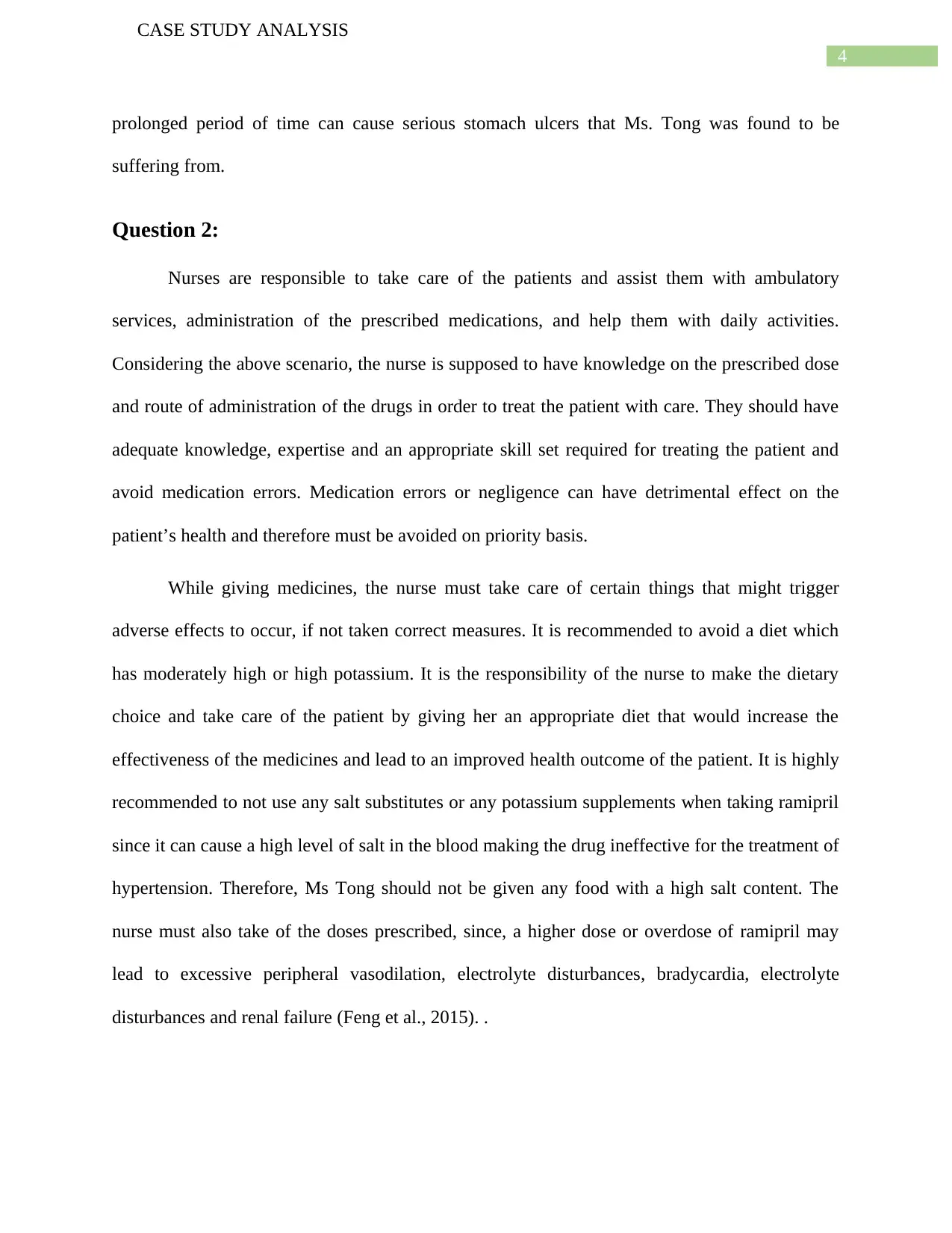
4
CASE STUDY ANALYSIS
prolonged period of time can cause serious stomach ulcers that Ms. Tong was found to be
suffering from.
Question 2:
Nurses are responsible to take care of the patients and assist them with ambulatory
services, administration of the prescribed medications, and help them with daily activities.
Considering the above scenario, the nurse is supposed to have knowledge on the prescribed dose
and route of administration of the drugs in order to treat the patient with care. They should have
adequate knowledge, expertise and an appropriate skill set required for treating the patient and
avoid medication errors. Medication errors or negligence can have detrimental effect on the
patient’s health and therefore must be avoided on priority basis.
While giving medicines, the nurse must take care of certain things that might trigger
adverse effects to occur, if not taken correct measures. It is recommended to avoid a diet which
has moderately high or high potassium. It is the responsibility of the nurse to make the dietary
choice and take care of the patient by giving her an appropriate diet that would increase the
effectiveness of the medicines and lead to an improved health outcome of the patient. It is highly
recommended to not use any salt substitutes or any potassium supplements when taking ramipril
since it can cause a high level of salt in the blood making the drug ineffective for the treatment of
hypertension. Therefore, Ms Tong should not be given any food with a high salt content. The
nurse must also take of the doses prescribed, since, a higher dose or overdose of ramipril may
lead to excessive peripheral vasodilation, electrolyte disturbances, bradycardia, electrolyte
disturbances and renal failure (Feng et al., 2015). .
CASE STUDY ANALYSIS
prolonged period of time can cause serious stomach ulcers that Ms. Tong was found to be
suffering from.
Question 2:
Nurses are responsible to take care of the patients and assist them with ambulatory
services, administration of the prescribed medications, and help them with daily activities.
Considering the above scenario, the nurse is supposed to have knowledge on the prescribed dose
and route of administration of the drugs in order to treat the patient with care. They should have
adequate knowledge, expertise and an appropriate skill set required for treating the patient and
avoid medication errors. Medication errors or negligence can have detrimental effect on the
patient’s health and therefore must be avoided on priority basis.
While giving medicines, the nurse must take care of certain things that might trigger
adverse effects to occur, if not taken correct measures. It is recommended to avoid a diet which
has moderately high or high potassium. It is the responsibility of the nurse to make the dietary
choice and take care of the patient by giving her an appropriate diet that would increase the
effectiveness of the medicines and lead to an improved health outcome of the patient. It is highly
recommended to not use any salt substitutes or any potassium supplements when taking ramipril
since it can cause a high level of salt in the blood making the drug ineffective for the treatment of
hypertension. Therefore, Ms Tong should not be given any food with a high salt content. The
nurse must also take of the doses prescribed, since, a higher dose or overdose of ramipril may
lead to excessive peripheral vasodilation, electrolyte disturbances, bradycardia, electrolyte
disturbances and renal failure (Feng et al., 2015). .
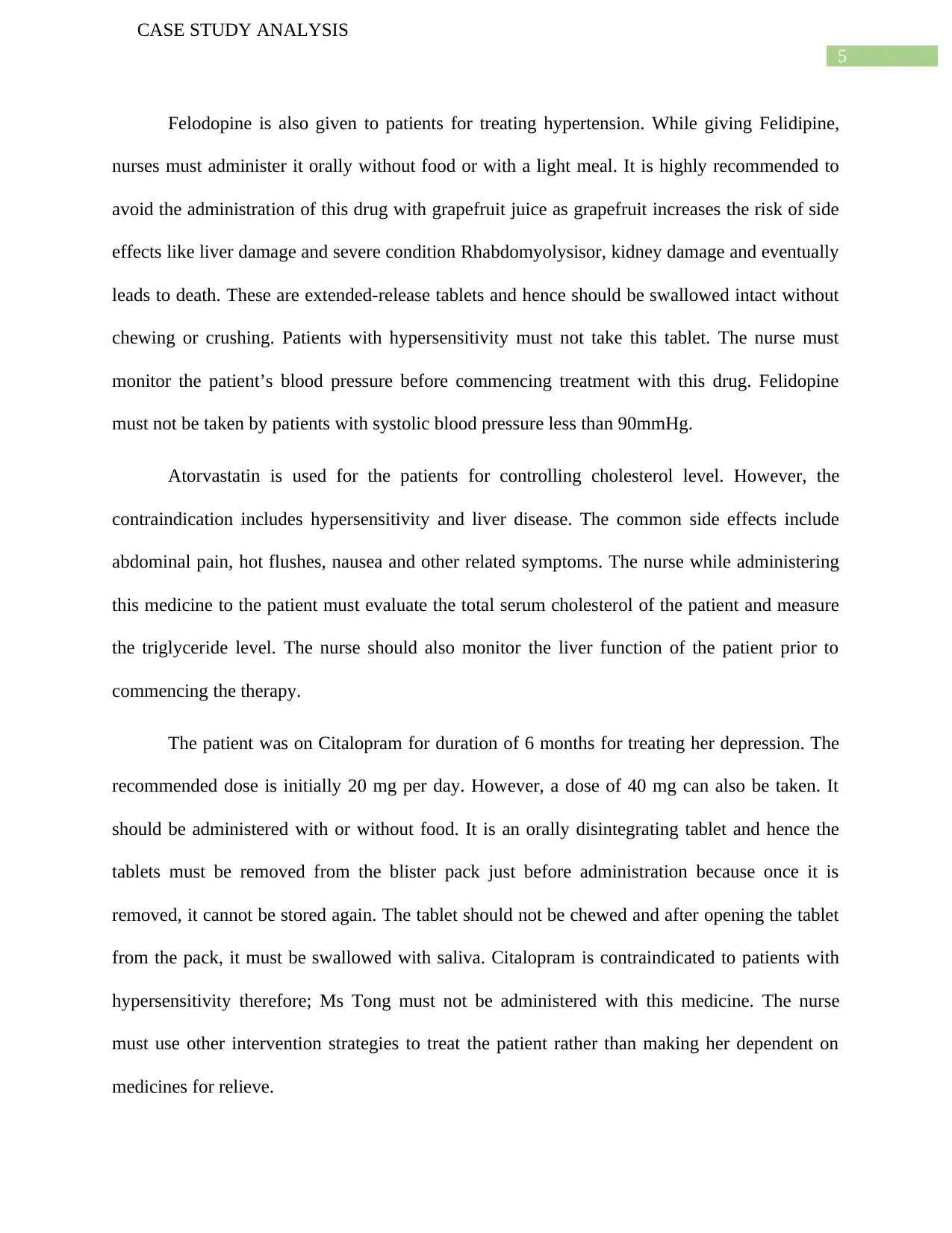
5
CASE STUDY ANALYSIS
Felodopine is also given to patients for treating hypertension. While giving Felidipine,
nurses must administer it orally without food or with a light meal. It is highly recommended to
avoid the administration of this drug with grapefruit juice as grapefruit increases the risk of side
effects like liver damage and severe condition Rhabdomyolysisor, kidney damage and eventually
leads to death. These are extended-release tablets and hence should be swallowed intact without
chewing or crushing. Patients with hypersensitivity must not take this tablet. The nurse must
monitor the patient’s blood pressure before commencing treatment with this drug. Felidopine
must not be taken by patients with systolic blood pressure less than 90mmHg.
Atorvastatin is used for the patients for controlling cholesterol level. However, the
contraindication includes hypersensitivity and liver disease. The common side effects include
abdominal pain, hot flushes, nausea and other related symptoms. The nurse while administering
this medicine to the patient must evaluate the total serum cholesterol of the patient and measure
the triglyceride level. The nurse should also monitor the liver function of the patient prior to
commencing the therapy.
The patient was on Citalopram for duration of 6 months for treating her depression. The
recommended dose is initially 20 mg per day. However, a dose of 40 mg can also be taken. It
should be administered with or without food. It is an orally disintegrating tablet and hence the
tablets must be removed from the blister pack just before administration because once it is
removed, it cannot be stored again. The tablet should not be chewed and after opening the tablet
from the pack, it must be swallowed with saliva. Citalopram is contraindicated to patients with
hypersensitivity therefore; Ms Tong must not be administered with this medicine. The nurse
must use other intervention strategies to treat the patient rather than making her dependent on
medicines for relieve.
CASE STUDY ANALYSIS
Felodopine is also given to patients for treating hypertension. While giving Felidipine,
nurses must administer it orally without food or with a light meal. It is highly recommended to
avoid the administration of this drug with grapefruit juice as grapefruit increases the risk of side
effects like liver damage and severe condition Rhabdomyolysisor, kidney damage and eventually
leads to death. These are extended-release tablets and hence should be swallowed intact without
chewing or crushing. Patients with hypersensitivity must not take this tablet. The nurse must
monitor the patient’s blood pressure before commencing treatment with this drug. Felidopine
must not be taken by patients with systolic blood pressure less than 90mmHg.
Atorvastatin is used for the patients for controlling cholesterol level. However, the
contraindication includes hypersensitivity and liver disease. The common side effects include
abdominal pain, hot flushes, nausea and other related symptoms. The nurse while administering
this medicine to the patient must evaluate the total serum cholesterol of the patient and measure
the triglyceride level. The nurse should also monitor the liver function of the patient prior to
commencing the therapy.
The patient was on Citalopram for duration of 6 months for treating her depression. The
recommended dose is initially 20 mg per day. However, a dose of 40 mg can also be taken. It
should be administered with or without food. It is an orally disintegrating tablet and hence the
tablets must be removed from the blister pack just before administration because once it is
removed, it cannot be stored again. The tablet should not be chewed and after opening the tablet
from the pack, it must be swallowed with saliva. Citalopram is contraindicated to patients with
hypersensitivity therefore; Ms Tong must not be administered with this medicine. The nurse
must use other intervention strategies to treat the patient rather than making her dependent on
medicines for relieve.
⊘ This is a preview!⊘
Do you want full access?
Subscribe today to unlock all pages.

Trusted by 1+ million students worldwide
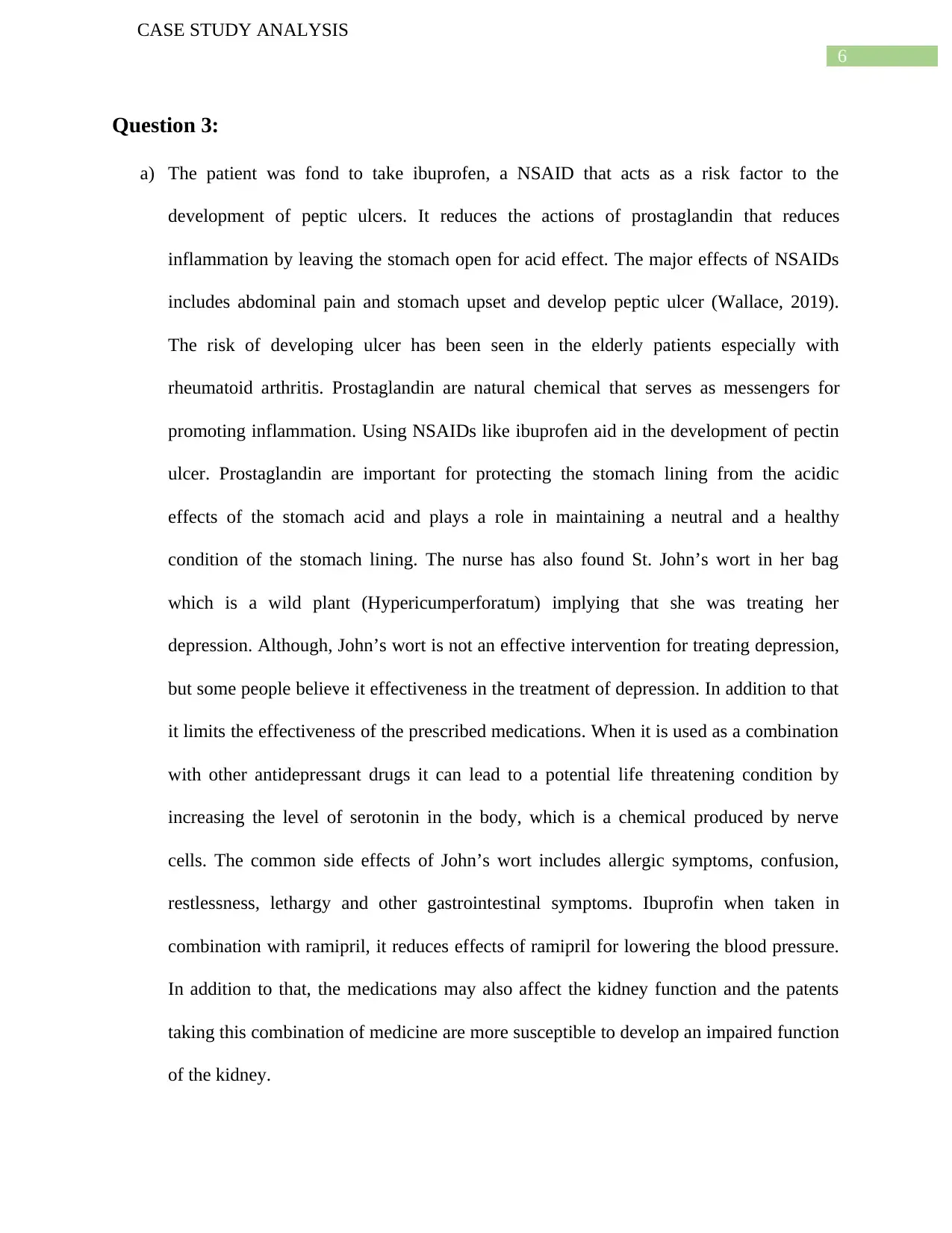
6
CASE STUDY ANALYSIS
Question 3:
a) The patient was fond to take ibuprofen, a NSAID that acts as a risk factor to the
development of peptic ulcers. It reduces the actions of prostaglandin that reduces
inflammation by leaving the stomach open for acid effect. The major effects of NSAIDs
includes abdominal pain and stomach upset and develop peptic ulcer (Wallace, 2019).
The risk of developing ulcer has been seen in the elderly patients especially with
rheumatoid arthritis. Prostaglandin are natural chemical that serves as messengers for
promoting inflammation. Using NSAIDs like ibuprofen aid in the development of pectin
ulcer. Prostaglandin are important for protecting the stomach lining from the acidic
effects of the stomach acid and plays a role in maintaining a neutral and a healthy
condition of the stomach lining. The nurse has also found St. John’s wort in her bag
which is a wild plant (Hypericumperforatum) implying that she was treating her
depression. Although, John’s wort is not an effective intervention for treating depression,
but some people believe it effectiveness in the treatment of depression. In addition to that
it limits the effectiveness of the prescribed medications. When it is used as a combination
with other antidepressant drugs it can lead to a potential life threatening condition by
increasing the level of serotonin in the body, which is a chemical produced by nerve
cells. The common side effects of John’s wort includes allergic symptoms, confusion,
restlessness, lethargy and other gastrointestinal symptoms. Ibuprofin when taken in
combination with ramipril, it reduces effects of ramipril for lowering the blood pressure.
In addition to that, the medications may also affect the kidney function and the patents
taking this combination of medicine are more susceptible to develop an impaired function
of the kidney.
CASE STUDY ANALYSIS
Question 3:
a) The patient was fond to take ibuprofen, a NSAID that acts as a risk factor to the
development of peptic ulcers. It reduces the actions of prostaglandin that reduces
inflammation by leaving the stomach open for acid effect. The major effects of NSAIDs
includes abdominal pain and stomach upset and develop peptic ulcer (Wallace, 2019).
The risk of developing ulcer has been seen in the elderly patients especially with
rheumatoid arthritis. Prostaglandin are natural chemical that serves as messengers for
promoting inflammation. Using NSAIDs like ibuprofen aid in the development of pectin
ulcer. Prostaglandin are important for protecting the stomach lining from the acidic
effects of the stomach acid and plays a role in maintaining a neutral and a healthy
condition of the stomach lining. The nurse has also found St. John’s wort in her bag
which is a wild plant (Hypericumperforatum) implying that she was treating her
depression. Although, John’s wort is not an effective intervention for treating depression,
but some people believe it effectiveness in the treatment of depression. In addition to that
it limits the effectiveness of the prescribed medications. When it is used as a combination
with other antidepressant drugs it can lead to a potential life threatening condition by
increasing the level of serotonin in the body, which is a chemical produced by nerve
cells. The common side effects of John’s wort includes allergic symptoms, confusion,
restlessness, lethargy and other gastrointestinal symptoms. Ibuprofin when taken in
combination with ramipril, it reduces effects of ramipril for lowering the blood pressure.
In addition to that, the medications may also affect the kidney function and the patents
taking this combination of medicine are more susceptible to develop an impaired function
of the kidney.
Paraphrase This Document
Need a fresh take? Get an instant paraphrase of this document with our AI Paraphraser
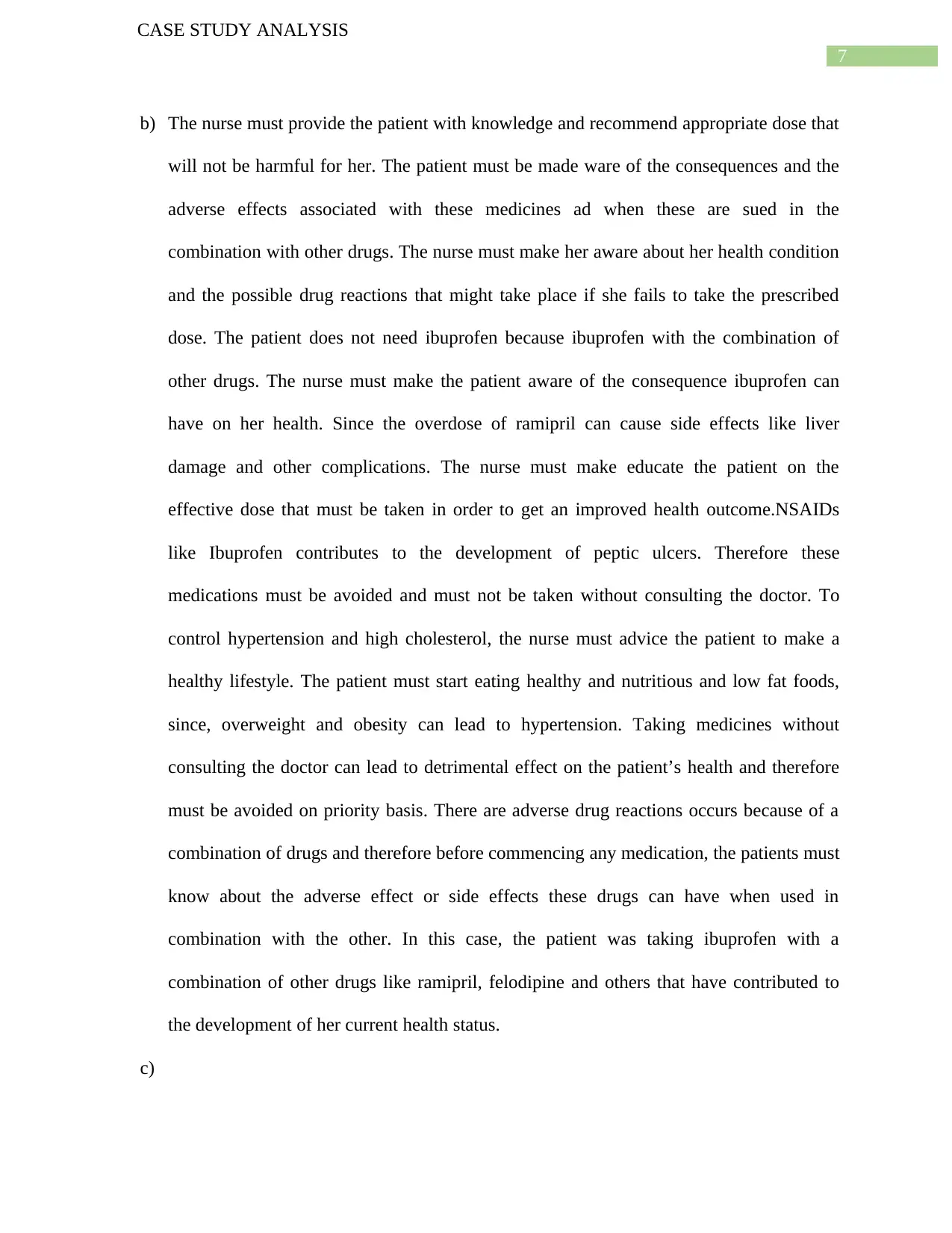
7
CASE STUDY ANALYSIS
b) The nurse must provide the patient with knowledge and recommend appropriate dose that
will not be harmful for her. The patient must be made ware of the consequences and the
adverse effects associated with these medicines ad when these are sued in the
combination with other drugs. The nurse must make her aware about her health condition
and the possible drug reactions that might take place if she fails to take the prescribed
dose. The patient does not need ibuprofen because ibuprofen with the combination of
other drugs. The nurse must make the patient aware of the consequence ibuprofen can
have on her health. Since the overdose of ramipril can cause side effects like liver
damage and other complications. The nurse must make educate the patient on the
effective dose that must be taken in order to get an improved health outcome.NSAIDs
like Ibuprofen contributes to the development of peptic ulcers. Therefore these
medications must be avoided and must not be taken without consulting the doctor. To
control hypertension and high cholesterol, the nurse must advice the patient to make a
healthy lifestyle. The patient must start eating healthy and nutritious and low fat foods,
since, overweight and obesity can lead to hypertension. Taking medicines without
consulting the doctor can lead to detrimental effect on the patient’s health and therefore
must be avoided on priority basis. There are adverse drug reactions occurs because of a
combination of drugs and therefore before commencing any medication, the patients must
know about the adverse effect or side effects these drugs can have when used in
combination with the other. In this case, the patient was taking ibuprofen with a
combination of other drugs like ramipril, felodipine and others that have contributed to
the development of her current health status.
c)
CASE STUDY ANALYSIS
b) The nurse must provide the patient with knowledge and recommend appropriate dose that
will not be harmful for her. The patient must be made ware of the consequences and the
adverse effects associated with these medicines ad when these are sued in the
combination with other drugs. The nurse must make her aware about her health condition
and the possible drug reactions that might take place if she fails to take the prescribed
dose. The patient does not need ibuprofen because ibuprofen with the combination of
other drugs. The nurse must make the patient aware of the consequence ibuprofen can
have on her health. Since the overdose of ramipril can cause side effects like liver
damage and other complications. The nurse must make educate the patient on the
effective dose that must be taken in order to get an improved health outcome.NSAIDs
like Ibuprofen contributes to the development of peptic ulcers. Therefore these
medications must be avoided and must not be taken without consulting the doctor. To
control hypertension and high cholesterol, the nurse must advice the patient to make a
healthy lifestyle. The patient must start eating healthy and nutritious and low fat foods,
since, overweight and obesity can lead to hypertension. Taking medicines without
consulting the doctor can lead to detrimental effect on the patient’s health and therefore
must be avoided on priority basis. There are adverse drug reactions occurs because of a
combination of drugs and therefore before commencing any medication, the patients must
know about the adverse effect or side effects these drugs can have when used in
combination with the other. In this case, the patient was taking ibuprofen with a
combination of other drugs like ramipril, felodipine and others that have contributed to
the development of her current health status.
c)
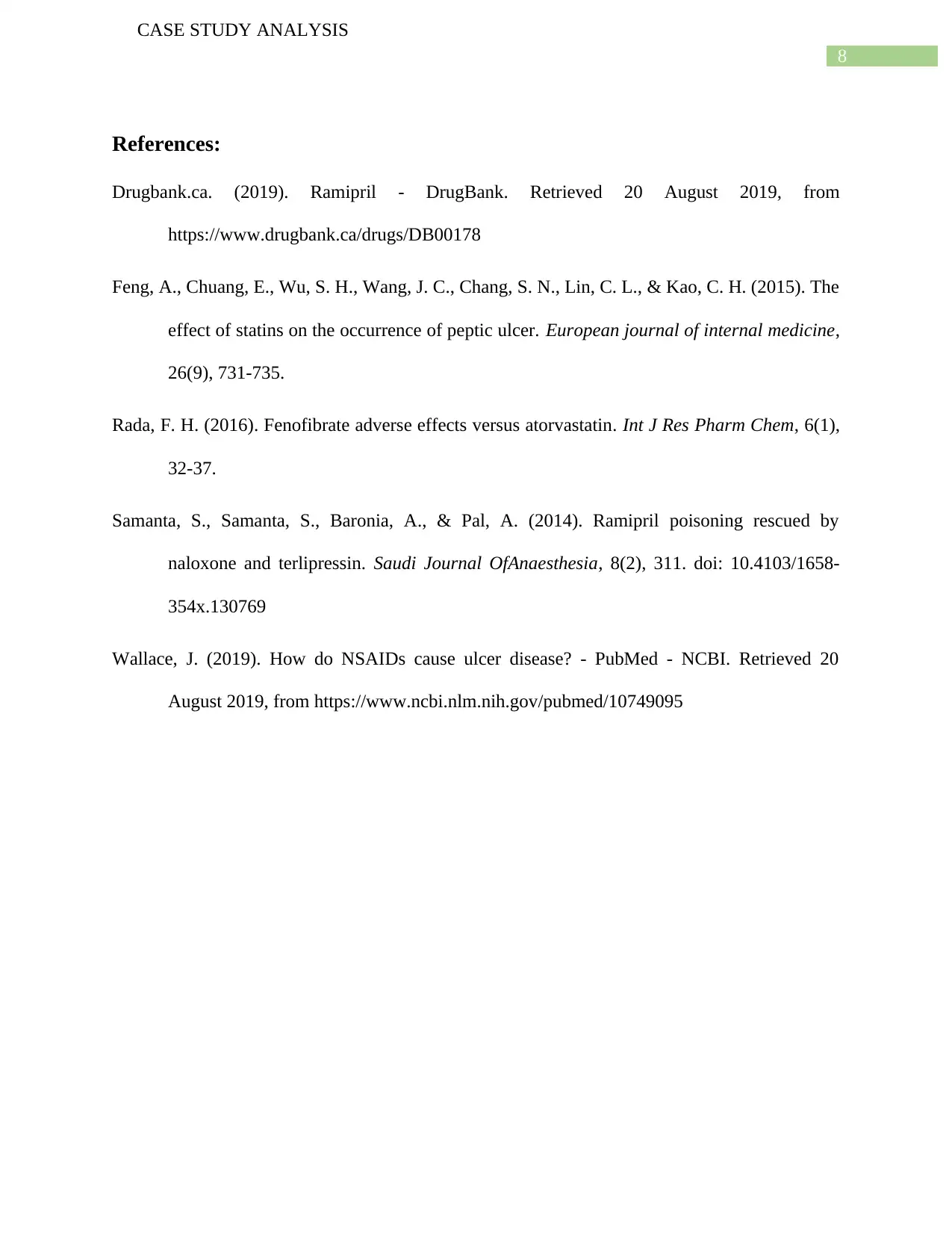
8
CASE STUDY ANALYSIS
References:
Drugbank.ca. (2019). Ramipril - DrugBank. Retrieved 20 August 2019, from
https://www.drugbank.ca/drugs/DB00178
Feng, A., Chuang, E., Wu, S. H., Wang, J. C., Chang, S. N., Lin, C. L., & Kao, C. H. (2015). The
effect of statins on the occurrence of peptic ulcer. European journal of internal medicine,
26(9), 731-735.
Rada, F. H. (2016). Fenofibrate adverse effects versus atorvastatin. Int J Res Pharm Chem, 6(1),
32-37.
Samanta, S., Samanta, S., Baronia, A., & Pal, A. (2014). Ramipril poisoning rescued by
naloxone and terlipressin. Saudi Journal OfAnaesthesia, 8(2), 311. doi: 10.4103/1658-
354x.130769
Wallace, J. (2019). How do NSAIDs cause ulcer disease? - PubMed - NCBI. Retrieved 20
August 2019, from https://www.ncbi.nlm.nih.gov/pubmed/10749095
CASE STUDY ANALYSIS
References:
Drugbank.ca. (2019). Ramipril - DrugBank. Retrieved 20 August 2019, from
https://www.drugbank.ca/drugs/DB00178
Feng, A., Chuang, E., Wu, S. H., Wang, J. C., Chang, S. N., Lin, C. L., & Kao, C. H. (2015). The
effect of statins on the occurrence of peptic ulcer. European journal of internal medicine,
26(9), 731-735.
Rada, F. H. (2016). Fenofibrate adverse effects versus atorvastatin. Int J Res Pharm Chem, 6(1),
32-37.
Samanta, S., Samanta, S., Baronia, A., & Pal, A. (2014). Ramipril poisoning rescued by
naloxone and terlipressin. Saudi Journal OfAnaesthesia, 8(2), 311. doi: 10.4103/1658-
354x.130769
Wallace, J. (2019). How do NSAIDs cause ulcer disease? - PubMed - NCBI. Retrieved 20
August 2019, from https://www.ncbi.nlm.nih.gov/pubmed/10749095
⊘ This is a preview!⊘
Do you want full access?
Subscribe today to unlock all pages.

Trusted by 1+ million students worldwide
1 out of 9
Related Documents
Your All-in-One AI-Powered Toolkit for Academic Success.
+13062052269
info@desklib.com
Available 24*7 on WhatsApp / Email
![[object Object]](/_next/static/media/star-bottom.7253800d.svg)
Unlock your academic potential
Copyright © 2020–2026 A2Z Services. All Rights Reserved. Developed and managed by ZUCOL.





